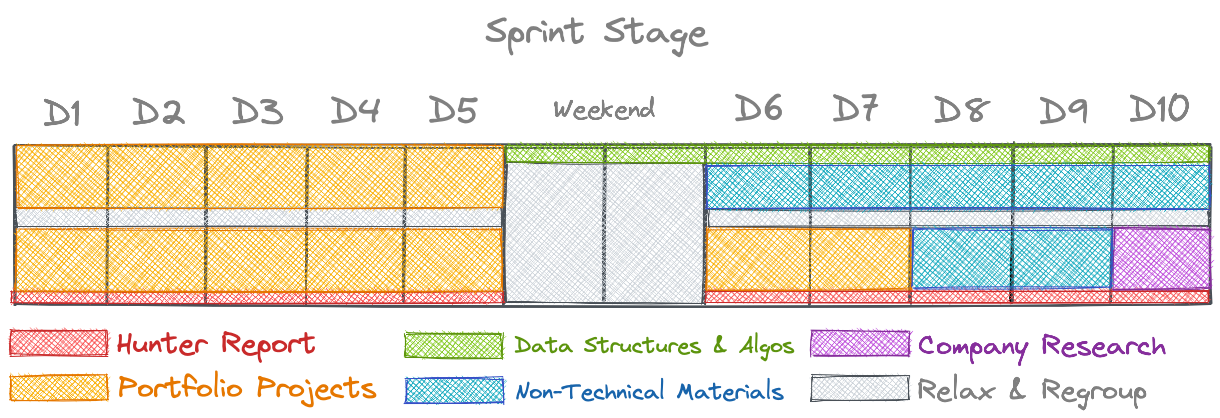Sprint Stage
Welcome to the Sprint Stage of your job search journey! Completing your education or training is a major milestone, but now it’s time to focus on perfecting your job search materials and preparing to officially enter the job market.
Contents
- Overview
- Sprint Goals
- Algos
- What to Focus On
- Daily Expectations
- Weekly Expectations
- Portfolio Management
- Knowledge Finance
- What Happens Next
- Pro Tips
- Resources
Overview
The next two weeks may seem overwhelming with a long to-do list, but by focusing on one thing at a time, you can make steady progress. Your time is valuable, and during the Sprint Stage, all of it should be directed towards preparing your mind and materials for the job search. This stage isn’t about finishing your training—it’s about getting your job search materials ready so that you can confidently enter the job market.
The Sprint Stage is busy, but if you maintain the momentum you've built during your training or education, you’ll be able to complete your job search materials and become job search ready.

Sprint Goals
The overall goal of the Sprint Stage is to finish your job search materials. To be job search ready, you need to ensure that all your materials are complete and polished, including but not limited to:
- Cover letter
- Resume
- Online presence (GitHub, LinkedIn)
- Portfolio site
- Solo projects
- Group project(s)
It’s very important that you do not submit job applications before you’re job search ready. An incomplete application portfolio—especially one with broken links or unfinished projects—can send the wrong message to employers, leading to automatic rejections.
Algos
While data structures and algorithms (DS&A) are crucial for technical interviews, they should not be your primary focus during the Sprint Stage. Your top priority should be completing your job search materials. You will have plenty of time to dive into DS&A once your materials are ready. Misplacing your focus now can add unnecessary time to your job search. Stay focused on getting your materials application-ready first!
What to Focus On
During the Sprint Stage, all of your attention should be on completing your job search materials. This stage is time-bound, and making the most of it is essential for progressing smoothly into the next phase of your job search. Avoid distractions like DS&A studying unless your materials are complete.
If you finish all your job search materials before the end of the Sprint, congratulations! You’re now job search ready and can move on to the Application Stage.
Daily Expectations
- Log your activity in a job tracking tool (e.g., Huntr)
- Create SMART daily goals
- Make at least 2 commits to GitHub each day
- Work on your projects and job search materials
- Check, read, and respond to emails, including your spam folder
- Research jobs and add at least 1 to your application queue to stay motivated
- Review your daily schedule to stay organized
Weekly Expectations
- Log at least 40 hours of job search-related activity
- Push at least 10 GitHub commits—check your GitHub activity for consistency
- Track your progress and adjust goals as necessary
Portfolio Management
Set up your Software Engineering Portfolio and schedule routine QA/maintenance for your portfolio projects. This includes ensuring that all project links are functional and that your portfolio is up-to-date.
What Happens Next
At the end of the two-week Sprint (or sooner if you finish early), you will move into either the Application Stage or the Overdue Material Completion Stage. The goal is to finish your materials within this time frame, but even if you don’t, you will move forward to the next phase at the end of the Sprint. The key to success in this stage is maintaining momentum and establishing strong time management habits early on.
Pro Tips
Here are some tips to help you move to the Application Stage as quickly as possible:
- Create and stick to a daily schedule—Establish good habits and routines as soon as you start the Sprint.
- Maintain momentum—While it’s tempting to take a break after completing your training, doing so can significantly extend your job search timeline. Stay focused!
- Prioritize group projects—If you’re collaborating on projects, complete these first, as your team will have a similar routine right after training.
- Focus on solo projects and non-technical materials next—After finishing group work, shift your attention to personal projects and polishing your resume, portfolio, and cover letter.
- Use this Guide to create daily and weekly SMART goals for yourself.
Resources
- Huntr Guide: Learn how to use Huntr or another job tracking tool to organize your job applications here.
- Virtual Study Halls: Join virtual study halls for focused sessions on coding, debugging, or job search materials. Collaboration is the key to success.
- Slack/Discord: Ask technical questions and seek advice from online communities to stay engaged during your job search.